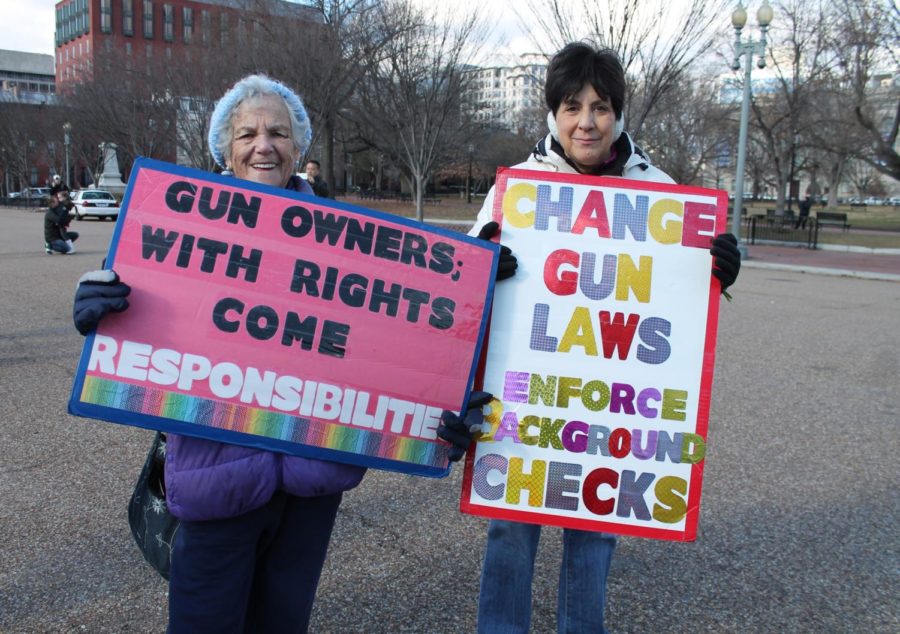Gun control saves lives
November 9, 2017
It’s 1999. Two teenaged boys open fire on Columbine High School: 13 people are killed, 24 are injured. Fast forward to 2007. Seung-Hui Cho opens fire on the Virginia Tech campus: 32 are killed, 23 are injured. Now it’s 2012. James Holmes shoots down a movie theater in Aurora, Colorado. 12 dead. 70 injured. Four months pass–Adam Lanza instigates a massacre in Sandy Hook Elementary: 26 dead, 2 injured. 2013: Washington Navy Yard; 12 dead. 2015: San Bernardino, California; 14 dead. 2016: Orlando Nightclub Massacre; 49 dead.
In 2017 alone, there have been 308 mass shootings (four or more people shot/killed in one incident), according to the Gun Violence Archive. And now, this; the Sutherland Springs, Texas shooting. With legally obtained guns, Devin Kelley, a man with a criminal record, murdered 26 church members. This shooting prodded at an already open wound, coming just over a month since the largest mass shooting in United States history: the recent tragedy in Las Vegas where Stephen Paddock opened fire on an outdoor concert, killing 58 people and injuring 527.
When breaking news announces a mass shooting, the response shouldn’t be “not again.” In a 2016 study of world-wide mass shootings, it was concluded that America had more incidents than any other country, according to a report by PhD Adam Lankford in the journal Violence and Victims. The American gun violence epidemic is not just limited to mass shootings–the United States has a gun homicide rate 25.2 times higher than other high-income countries, according to a report in the American Journal of Medicine.
On a global level, the United States stands out–and not in a good way. Along with this American outlier is another one.
The lack of strong civilian gun laws differentiates the U.S. from other high-income countries, according to the Small Arms Survey Report. Correlation is not causation, but this connection is glaring enough that Congress should examine it closely–especially since other developed nations have the reverse situation.
I don’t think people should be able to purchase assault rifles, I don’t believe that there’s any need in a day-to-day basis for that, something needs to change otherwise nothing is going to get better
— Gracie Uttley
Take Australia as an example. Following a 1996 mass shooting in Port Arthur, Tasmania in which 35 people died, the Australian government implemented stricter gun control; they banned rapid-fire long guns and private firearm sales, created a semi-automatic and pump-action rifle government buy-back program and required that all guns be licensed to their registered owners and approved by the police. In the 18 years leading up to the new laws there were 13 mass shootings; in the 10 and a half years following them there were none, according to University of Sydney School of Public Health report.
Australia isn’t an anomaly either. England and Japan not only have strict gun control laws, but also some of the lowest gun homicide rates in the world. England has 0.04 killings per 100,000 people and Japan has 0.03 per 100,000. In contrast, the United States has 3.42 killings per 100,000 people, according to a report published in the Points of View Reference Center.
Despite the positive standards set by other countries and the continuous stream of tragedies in America, change is not being made.
While it is true that the Second Amendment grants the right to bear arms, the rest of the details are foggy. How difficult should it be to acquire a gun? Should there be a limit to or a federal record of gun purchases? Should assault weapons be banned? None of these questions are addressed in the constitution–they’re fair game for legislators to address.
Stricter gun control does not mean that every privately owned gun will disappear into a black hole. Rather, it means that it will be less likely for guns to fall into the wrong hands, like into those of mentally ill shooters.
“The easiest way for me to think about gun control is to make the analogy to driving laws,” senior Oscar Edwards-Hughes said, “There are laws put in place to keep other drivers/people safe. You have to take a long course to learn about these laws. Then you have to take a test…to see if you are eligible to drive. Gun control should be the same thing.”
Current gun laws are more relaxed than many might think. Take the “gun show loophole” as an example–federal laws allow unlicensed people to sell firearms without background checks or sale records, thus allowing guns to fall into violent hands, according to a joint study by the U.S. Bureau of Alcohol, Tobacco, Firearms and Explosives; the Department of Justice and the Department of the Treasury.
In states that required background checks for all gun sales, there were 47 percent fewer women shot to death through domestic violence, according to Every Town Research. Background checks evidently make a difference–it’s time to nationally mandate them in every situation.
67 percent of gun owners cite self-protection as the top reason they need a gun, according to the Pew Research Center, but there are glaring holes in that defense. Having a gun in the home for self-defense does not make the home safer. Instead of aiding protection, those who live in homes with guns are nearly three times more likely to be shot by a family member or acquaintance in the house, rather than an intruder, according to a Harvard Public Health report.
Furthermore, “family and intimate assaults” that used firearms were 12 times more likely to result in death than non-firearm related assaults, according to a report published in the Journal of the American Medical Association.
As for self-protection outside of the house, guns have shown little effect in actually helping. In 29,618,300 violent crimes from 2007 to 2011, only 0.8 percent of the victims used a gun to threaten or attack the perpetrator of the crime, according to the National Crime Victimization Survey conducted by the Bureau of Justice Statistics. The National Crime Victimization Survey found that victims using a gun for self-defense were no less likely to to be injured after taking self-defense measures, than victims who used other protective measures, according to the Harvard Injury Control Research Center.
Gun-related suicides are an often overlooked epidemic as well, with suicide accounting for around 60 percent of total firearms deaths in 2010, according to the Centers for Disease Control and Prevention.
Suicide attempts with guns result in death over 90 percent of the time; on the flip-side, those who attempt suicide through pill ingestion or wrist cutting survive over 90 percent of the time, according to an article published in the JAMA Network Journals. This is pivotal information, considering that 90 percent of suicide-survivors will not die from suicide later on, according to a Harvard Public Health Report. If guns were harder to obtain, the suicide rate could drastically decrease.
There’s no doubt that guns have grown more lethal since the constitution was originally written. When the Bill of Rights was ratified in 1791, the founding fathers owned muskets not AR-15s. The times have changed, and when debating constitutional issues it’s important to consider the context. Guns are more dangerous and high-tech these days; that’s an important factor in the gun control debate.
“I don’t think people should be able to purchase assault rifles, I don’t believe that there’s any need in a day-to-day basis for that,” junior Gracie Uttley said, “Something needs to change otherwise nothing is going to get better.”
As a nation moving forward from tragedy after tragedy, it’s imperative to be open to change. The history of the United States has been a series of adaption to the times. If such changes were never made, slavery would be legal and women would not be able to vote. While gun control is not correcting the subjugation of a people, the point still stands. America’s gun-centric culture may seem like part of the nation’s DNA–but change and progression should be seen as just as American, if not more.





